The Gujarat High Court on Tuesday said the Oreva Group, which was responsible for the operation and maintenance of the Morbi suspension bridge that collapsed in 2022, should come out with a “positive solution” regarding payment of compensation to the kin of victims.
The division bench of Chief Justice Sunita Agarwal and Justice Aniruddha P Mayee was hearing a suo motu PIL on the collapse of the British-era suspension bridge on the Machchhu River in Morbi on October 30, 2022, in which 135 people were killed.
The court said that as far as the compensation is concerned, the company will “have to come out with a positive solution and concrete things”.
“As on date, we are not doing anything half-heartedly. They (the company) will have to come out with a positive solution and concrete things have to be there,” Chief Justice Agarwal observed orally.
“You will have to create a Trust (for compensation ) …What we have suggested on the last occasion is that you have to take care of everyone till his last breath. ..If there is a Trust, then there is a body independent of individuals, and that body may take care of it,” she said.
As far as the payment of compensation to the victims by the company is concerned, the latter shall submit an affidavit of authorised officers only after completing the process of how it will go about it, the court said and posted the matter for hearing on February 26.
Acting on the court’s direction, the state government provided details of the injured persons who required mental treatment and those who suffered disabilities of 40 per cent and more.
In its affidavit, the government also provided details of widows and dependent elderly parents of people who died in the incident and children orphaned or left with one parent after the incident.
Advocate General Kamal Trivedi said an assessment was made regarding the victims and details provided to the company “to see that suitable amounts of compensation are decided and the company may take a call on it”.
Four victims of the tragedy required mental treatment, and they were sent to the civil hospital for further check-ups, while treatment was provided at home for 54-year-old Kusum Rathod after she said she couldn’t visit a hospital, he said.
Out of 74 persons who were injured in the incident, 18 suffered minor injuries and were discharged after a few days, and another 56 required further treatment and follow-ups, he said.
Of these people, three have suffered disabilities of 40 per cent or more, Trivedi informed the court.
Ten women lost their husbands to the tragedy, and of them, four have given their consent for a job offered by the Oreva Group, and six refused a job, as one was already working as a conductor, and another woman said she only needed a sewing machine, he said.
Families of two other widows did not permit them to take up a job, and one said she had to take care of a baby and could not go out, the A-G said.
“They are ready to accept sewing machines and monthly monetary compensation from the company,” he said.
Apart from this, there are 45 elderly persons, who are above 50 years of age, left behind by the deceased, he said.
Also Read
In the case of children, seven have been orphaned, and 14 have lost a parent, Trivedi said.
The court required more clarity on them.
Nirupam Nanavaty, the lawyer representing the Oreva Group, said the company will render “all support possible” to the victims, and details regarding the compensation have been placed and required fine-tuning.
As far as orphans are concerned, the company is paying yearly expenditures for education, food, clothing and boarding and has paid Rs 50,000 per child, he said.




